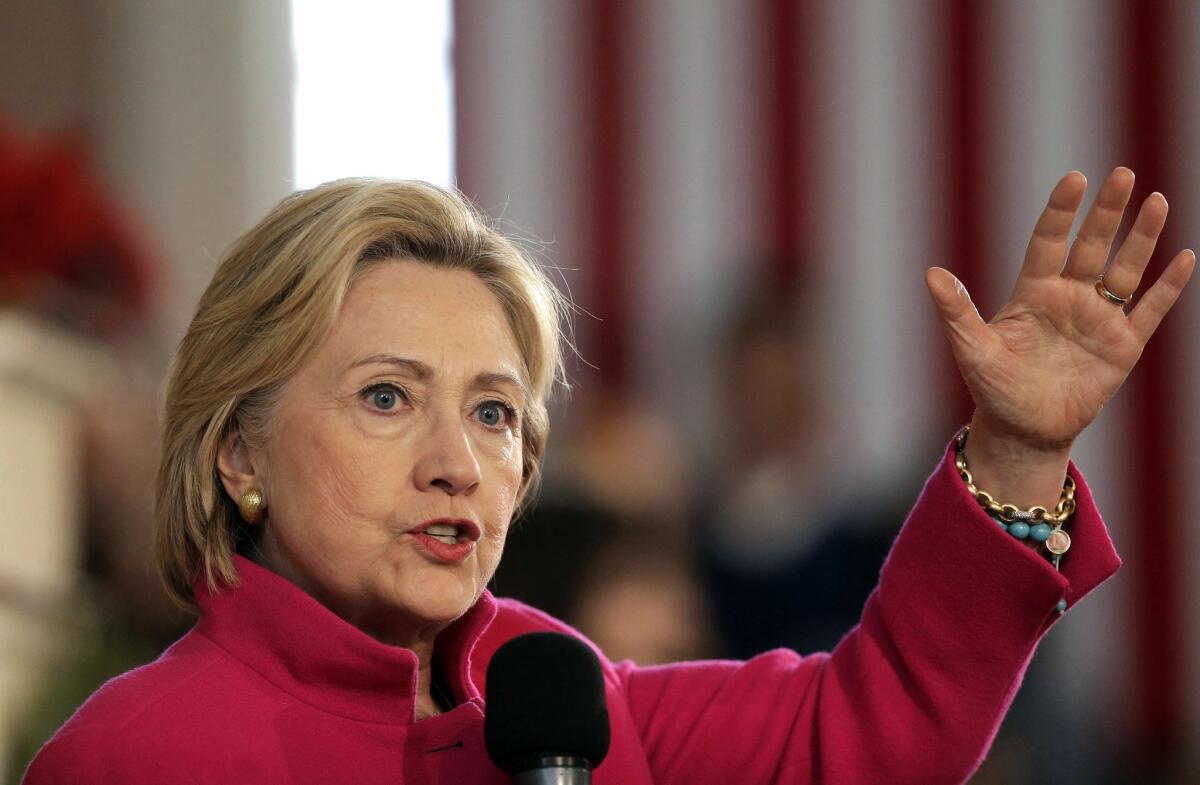Five unknowns that could determine the winner in 2016

Hillary Clinton speaks in Portsmouth, N.H. Despite a year of campaigning, 10 televised debates and millions of dollars in advertising, most people in even the earliest presidential voting states are just now beginning to focus on their choices in the 2016 campaign.
Reporting from Washington — Anyone who confidently predicts the outcome of this year’s presidential race is either not serious or seriously delusional.
Particularly on the Republican side, the number of plausible scenarios outstrips anyone’s ability to forecast. But we can highlight five of the key unknowns.
How will Donald Trump respond to losing?
Rarely does a candidate run the table in the primaries. Except for incumbent presidents seeking a second term, almost every candidate loses somewhere.
For Trump, that first loss could come early. In Iowa, which holds the first contest of the nominating race on Feb. 1, Trump has trailed Sen. Ted Cruz of Texas in most polls for the last month.
What factor do you think will have the biggest impact on the 2016 election? Weigh in on Facebook >>
Losing stings any politician, but for Trump, who brags so much about his standing in polls and has built his image so thoroughly around being a “winner,” the impact could be particularly harsh.
Does he bounce back from a loss or does it send his campaign into a downward spiral? Does he begin to spend large amounts of his own money – something he has avoided so far? Do his supporters, many of whom are already alienated from politics, grow discouraged if they see him defeated?
Does turnout go up?
Even in hotly contested years, only a fraction of voters actually take part in primary elections.
Iowa, for example, has nearly 2.1 million registered voters. In 2012, in a fiercely contested Republican race, only a bit more than 121,000 turned out to vote in the party caucuses. That was slightly fewer than one-fifth of the GOP’s registered voters.
That’s about average for both parties. In 2008, however, then-Sen. Barack Obama’s campaign broke the pattern, organizing tens of thousands of first-time caucus goers, getting them to show up on a frigidly cold evening and boosting turnout to almost 4 in 10 Democrats.
Can any of this year’s candidates pull off a similar feat, either in Iowa or other early voting states?
Sen. Bernie Sanders’ hopes for pulling off an upset victory over Hillary Clinton depend on that. Trump’s chances may also go up if turnout rises – many of his supporters are not traditional primary voters.
Turnout is hard to predict in advance. And for all the news coverage and attention, most voters are only now beginning to focus on their choices.
But so far, pollsters who have done well at predicting turnout in the past, such as J. Ann Selzer, whose surveys have long been the gold standard for polling in Iowa, say they don’t see signs of a wave of new voters.
Where can Marco Rubio break through?
His cadre of admirers often refer to the junior senator from Florida as a potential “transformational” candidate – one who could change the Republican Party’s image with voters, much as Bill Clinton did for Democrats in 1992.
First, however, Rubio would have to actually win the nomination, and for all his skill as a politician, the path to that goal has proven elusive.
Trump has changed the dynamics of the GOP race in a way that hasn’t helped Rubio. At the same time, Sen. Ted Cruz of Texas has consolidated support among the most conservative Republicans, forcing Rubio to compete in a scrum of candidates seeking more moderate voters.
Rubio’s aides insist that all is well. Cruz may have peaked too early, they suggest, and is now every other candidate’s target. Support for their candidate will crest at just the right time, they say.
So long as no one candidate sweeps the early contests, Rubio could still emerge the winner because he is the candidate who is most acceptable to the broadest swath of the party’s voters as well as its influential big donors.
But winning the nomination without actually coming in first in any early state is tough.
Rubio almost certainly needs to win the primary in his home state, Florida, on March 15. But to do that, he’ll probably need to score some other victories first.
Rubio’s strategists once made confident predictions about South Carolina as their breakout state. Aides now point to Nevada. If Cruz’s lead persists in Iowa, he, and whoever wins New Hampshire, will pose a major obstacle to Rubio in both those states.
What about that FBI investigation into Clinton’s emails?
So far, Sanders has not shown an ability to defeat Clinton. He has raised a lot of money -- $33 million in the final three months of the year, almost as much as Clinton — and has more than a million small-dollar donors, but Clinton continues to command the support of a large majority of Democrats and leads in polls of all the early primary states except New Hampshire.
But the email issue continues to cast a shadow.
Law enforcement officials have said Clinton is not a target of their investigation. They say they are seeking to determine if people who worked for her at the State Department mishandled classified information in several emails they sent her.
Still, investigations can take sudden turns, and as long as this one continues, its outcome will remain a big question mark over the 2016 race.
Will demographics outweigh the desire for change?
Pay no attention to polls of hypothetical general election matchups – they’re mostly meaningless right now. Almost regardless of who wins the Republican nomination, the 2016 general election seems likely to be close.
After eight years of George W. Bush and eight more of Obama, the country remains nearly evenly divided between Democrats and Republicans, and the gap between the two parties has widened.
Young versus old, minority versus white, secular versus religious, liberal versus conservative, urban versus rural – all these splits in American society have come to coincide with the partisan division.
The number of Americans who shift back and forth between parties has fallen to a low ebb, and partisan polarization has not been so strong for a century.
Perhaps if Trump becomes the GOP nominee -- or if he runs as a third-party candidate – that dynamic will change. But other than that, the likelihood is strong that the 2016 election, like the contests in 2008 and 2012, will come down to a relative handful of voters in a small number of states, including Florida, North Carolina, Virginia, Ohio, Colorado, Nevada and perhaps a few others.
Both parties will seek to boost the turnout of their supporters. Republicans will be hoping that after eight years of a Democrat in the White House, the desire for change will swing enough voters their way.
Democrats will pin most of their hopes on mobilizing and turning out the coalition of white liberals, minorities, single women and urban voters that put Obama in the White House.
How much will black voter turnout fall without the country’s first black president on the ballot? Will Latino voters show up in greater numbers? Will Clinton, if she wins the Democratic nomination, expand the Democrats’ usual lead among women?
Or will fatigue with the party in power swing a few key states to the opposition as has happened before after two-term presidencies? Those questions, in the end, will probably matter more to the outcome than all the headlines between now and election day.
For more on politics and policy, follow @DavidLauter
More to Read
Get the L.A. Times Politics newsletter
Deeply reported insights into legislation, politics and policy from Sacramento, Washington and beyond. In your inbox three times per week.
You may occasionally receive promotional content from the Los Angeles Times.











